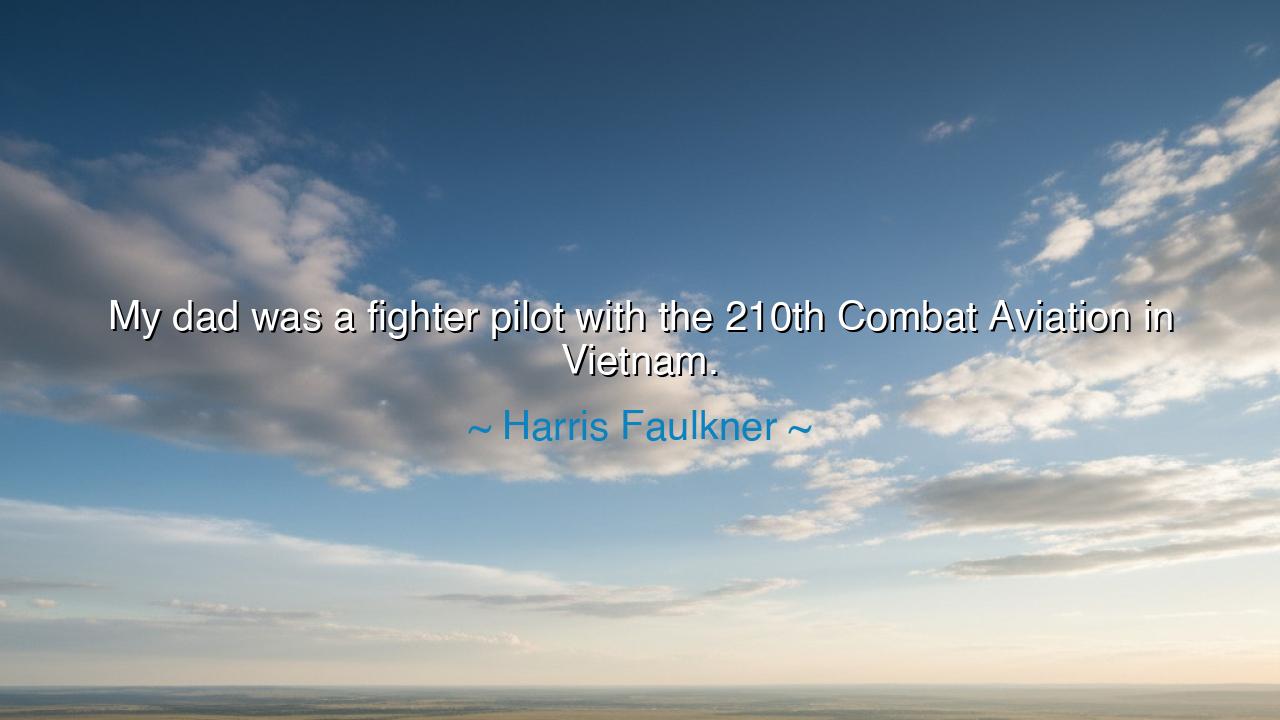
My dad was a fighter pilot with the 210th Combat Aviation in






When Harris Faulkner said, “My dad was a fighter pilot with the 210th Combat Aviation in Vietnam,” she spoke not only of lineage but of legacy—of courage passed from one generation to the next. Her words carry the echo of engines roaring through the skies of war, the weight of duty that transcends time, and the sacred bond between parent and child that is forged not only by love, but by example. In this single line, she reminds us that behind every quiet strength, there is often a story of sacrifice. Her father’s wings did not just lift him above the jungles of Vietnam; they lifted his family—his daughter included—into a life guided by discipline, honor, and the unyielding pursuit of excellence.
The 210th Combat Aviation Battalion, active during the Vietnam War, was one of the many air units that carried soldiers through the perilous skies, bringing supply, rescue, and fire support to the ground forces below. For a pilot to serve there was to live daily between life and death—to dance on the razor’s edge of danger while holding firm to duty. When Faulkner speaks of her father, she invokes not merely a man of the military, but a man of valor, one who faced chaos so that others might live in order. His courage, like that of all who flew those missions, became a quiet inheritance—one that would later shape her own fearlessness in the arena of journalism, where truth, like flight, demands both clarity and control.
To be raised by a warrior is to understand early the meaning of sacrifice. The child of a soldier learns that love sometimes wears a uniform, that devotion can take the form of absence, and that the truest strength is not always seen, but felt. From her father, Faulkner inherited not only stories of battle but the deeper wisdom of service and discipline. In his calm under pressure, she found the model of her own composure. In his unwavering commitment to duty, she found the blueprint for her own resilience. Her words, though simple, are a tribute to the unseen chain of influence that binds generations—the way one life of bravery can kindle a lifetime of purpose in another.
The ancients would have honored such lineage as sacred. In Greece, the sons of warriors were taught to bear the weight of their fathers’ shields, not merely as weapons, but as symbols of duty fulfilled. The Romans built entire philosophies upon the idea that virtue—virtus—was passed from father to child through example and honor. So too, in the Faulkner family, the father’s courage became the daughter’s compass. The battlefield gave her father wings; his example gave her a voice. And in that voice, now heard across the modern world, we can still hear the echo of those engines—the rhythm of heritage transformed into purpose.
History offers many such mirrors. Consider Eleanor Roosevelt, whose father, Elliott Roosevelt, instilled in her a deep sense of compassion and courage before his early death. Though her father’s physical presence vanished, his moral imprint endured, shaping her into one of the most influential voices for human rights in history. Like Harris Faulkner, she carried forward the best of her father’s spirit—the strength to stand firm in times of trial, to lead with both power and grace. Both women remind us that the nobility of the parent becomes the inheritance of the child, not through wealth, but through the living example of courage, integrity, and love.
In Faulkner’s words, there is also reverence for the cost of such service. To be the child of a soldier is to live with the knowledge that freedom is never free—that someone, somewhere, pays for it with sweat, fear, and sometimes blood. Her acknowledgment of her father’s role is not just pride—it is gratitude, spoken on behalf of a generation that benefits from sacrifices it can never fully repay. It is a reminder to the young and the comfortable that their peace rests upon the shoulders of those who risked everything to defend it. The fighter pilot of the past and the journalist of the present are both servants of truth—one defending it with courage in the skies, the other defending it with integrity in words.
So let this teaching take root in the hearts of all who hear: honor your origins, for they are the soil from which you grow. Remember those who came before you—those who fought battles, visible and invisible, so that you might walk freely beneath a safer sky. Let their courage live again in your choices, their discipline guide your hands, their integrity shape your days. Whether your inheritance comes from the battlefield, the classroom, or the hearth, carry it forward with gratitude and strength. For as Harris Faulkner reminds us, we are all heirs of sacrifice, and our duty is not merely to remember, but to rise—to live lives worthy of those who came before.






AAdministratorAdministrator
Welcome, honored guests. Please leave a comment, we will respond soon